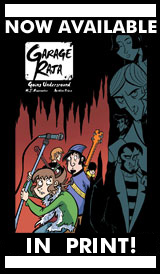Awfully Lovely

forgetters seem to understand like few other musicians since Joy Division that the line between beauty and horror isn’t even razor thin: it’s nonexistent. Their style – which oscillates between a sort of gothic synth psychedelic rock on tracks such as “Oh Deadly Death†and “Not Immune†(in which Blake Schwarzenbach sounds more like a vampire than we ever thought possible), the wide and open emotive mellow rock of “Hoop and Swan†and the crushing, impossible weight of plodders such as “In America†and “Ribbonhead†– might best be described as “mentally and emotionally drainingâ€. It’s not that the songs are joyless – there is a wonderful bit of resistant, defeated triumph in “Turn Away†and the tinny “Strike†(coincidentally, these two songs are placed right at the beginning of the album, as if to clear the way) – but even at the best of times, the songs demand such an emotional investment that a meager three minute track seems to last for tens of minutes. “Hoop and Swan†is particularly demanding: a masterpiece of resentment born of isolation, it finds Blake at his best both lyrically and musically, the wailing warble of his guitar matched only by the wounded yowling of his vocals and the delicate, dignified pain of his lyrics . This is disenfranchisement given voice, a punk-rock anthem of simultaneous defeat and resistance unmatched by the clumsy literalism of more overtly political acts.
Huge and sweeping, it is also one of the few songs that allows the listener room. If there is any space to breathe between tracks like the heartbreakingly grounded “Die By Your Own Hand,†or the jack-booted march of “Ribbonhead,†(which, with its slow, heavy, inexorable move towards some grim conclusion is almost martially oppressive in scope) it is hidden in the cracks. Though “Seconds†is lighter than most tracks, given a fuzzy warmth by the high levels of distortion and poppy arrangement, it hides the most vitriolic lyrics on the album; Blake’s accusation that “it took seconds of your time to take his life†is wince inducing not because he delivers it with a yell but because he delivers it flat: it’s not even an accusation, it’s a statement of fact given awful moral weight by his Blake’s cast-iron deadpan. It’s no use looking to “Les Arrivisetes,†with its jingly opening, for succor: what begins easily enough builds quickly towards a startling and rocking anticlimax. By the time one has arrived at “In America†it is hard not to sympathize with the song’s – and Blake’s – need for escape: the torrent of negative emotions is so overwhelming that one feels the need for any kind of release, some kind of distance.
But the reward for enduring what might seem at first oppressively morbid is one of the lyrically richest, sonically dense albums to come out of punk rock’s depressingly shallow repertoire since Ian Curtis marked the scene. Hardly content to fall in with more facile goth rock – here you will find no hackneyed romanticizing of death, no maudlin doting on adolescent heartbreak, no hokey pandering to the audience’s status as “different†– forgetters’ freshman effort tackles the darkest sides of human experience and emotion with all the gravity due them. The result is, fittingly, one of the most life-affirming, positive albums around: if even the world’s ills can inspire such art, there’s still much to live for.






